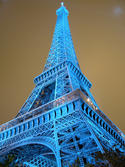For more than one-third of a century Jerry Brown has proved one of the most interesting and original figures in American politics--and the 71-year-old former wunderkind might be back in office in 2010. If he indeed wins California's gubernatorial election, the results could range from somewhat positive to positively disastrous. read more »
Politics
The Failed State of California - The Changing Landscape of America
The Golden State is not so golden anymore. California is broke. With a $20 billion dollar deficit and tax revenues down 27% from last year, Governor Schwarzenegger looks to Washington D.C. for a bail-out to rescue the state from financial ruin. Like the executive passing a beggar on a street corner, Washington looks the other way. Unemployment is statistically 12.3%, but functionally, it runs closer to 20% of the work force. Nowhere is unemployment more tragic than in the Central Valley, the fruit and vegetable producer of the world. read more »
Biotech Research No Silver Bullet for Florida
By Richard Reep
Until recently, Florida was the king of growth, agriculture, and tourism. Growth – at 900 immigrants a day from other states – characterized Florida’s landscape for over 30 years, and growing cities were in perennial battle with agriculture up until the watershed year of 2009. As a tourist destination, Florida claimed world-class status, which once served the state just fine. Now, gasping for breath and facing financial uncertainty, Florida’s leadership frantically seeks a new silver bullet to create jobs, focusing on biomedical research. This focus is timely and important, and can truly move the state in a new direction, and the state leadership’s resolve to diversify the economy should stay strong, even with a short-term lack of results. read more »
Decentralize The Government
From health care reform and transportation to education to the environment, the Obama administration has--from the beginning--sought to expand the power of the central state. The president's newest initiative to wrest environment, wage and benefit concessions from private companies is the latest example. But this trend of centralizing power to the federal government puts the political future of the ruling party--as well as the very nature of our federal system--in jeopardy. read more »
Young People Living Off the System in Sweden
There are those who believe that Sweden has a low level of unemployment. This is far from the truth. The combination of high taxes, generous government benefits and a regulated labor market has led to many Swedes to rely on handouts rather than work. The system does succeed in one thing: hiding the true unemployment. read more »
Obama's Middle-Class Meltdown
The rapid decline in public support for Democrats and President Obama represents one of the most breathtaking political collapses in modern times. Little over a year from a huge electoral triumph, President Obama’s level of support has dropped from around 65% to under 50%. The Democrats in Congress, who held as much as a 10% edge over the Republicans last spring, are actually losing a “generic” vote.
Many Republicans and conservatives may think this represents a confirmation of their values. Yet in reality, the Democratic meltdown has less to do with belated admiration for the GOP—their support as a party remains at historically low levels—than a question of a massive disconnect between the people in power and the large, middle-class majority. read more »
America's European Dream
The evolving Greek fiscal tragedy represents more than an isolated case of a particularly poorly run government. It reflects a deeper and potentially irreversible malaise that threatens the entire European continent.
The issues at the heart of the Greek crisis – huge public debt, slow population growth, expansive welfare system and weakening economic fundamentals – extend to a wider range of European countries, most notably in weaker fringe nations like Portugal, Italy, Ireland, Greece and Spain (the so-called PIIGS). These problems also pervade many E.U. countries still outside the Eurozone in both the Baltic and the Balkans. read more »
The Transportation Community Braces for Continued Uncertainty
Recent game changing events — notably, the Massachusetts election depriving the Senate Democrats of a filibuster-proof 60-vote majority, and the projected record breaking $1.6 trillion deficit in the FY 2011 budget proposal — have introduced serious uncertainties into the President’s domestic agenda. The federal surface transportation program is no exception. read more »
- Login to post comments
Atlanta: Ground Zero for the American Dream
The Atlanta area has much to be proud of, though it might not be obvious from the attitudes exhibited by many of its most prominent citizens. For years, local planners and business leaders have regularly trekked to planning’s Holy City (Portland) in hopes of replicating its principles in Atlanta. They would be better saving their air fares. read more »
Reforming Anti-Urban Bias in Transportation Spending
State governments have to stop treating transportation like yet another welfare program.
Among urban and rural areas, who subsidizes whom?
It's methodologically difficult to measure net taxation, but the studies that have been done suggest that, contrary to the belief of some, urban areas are big time net tax donors. For example, a recent Indiana Fiscal Policy Institute study found that Indiana's urban and suburban counties generally subsidize rural ones. read more »






















